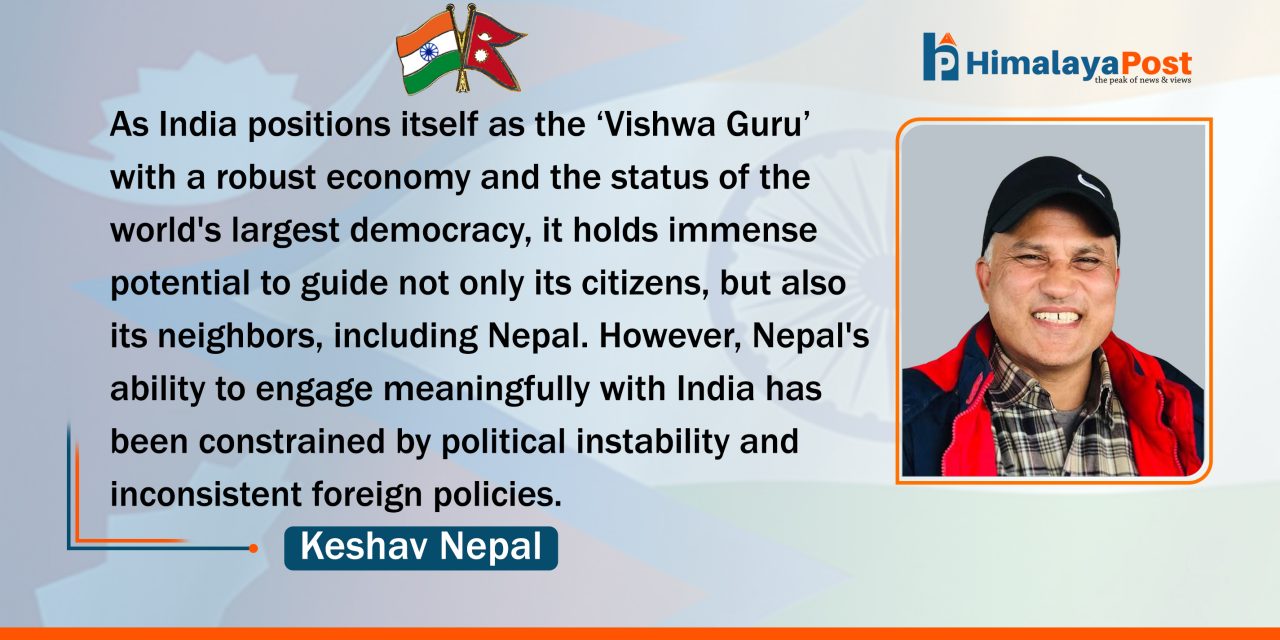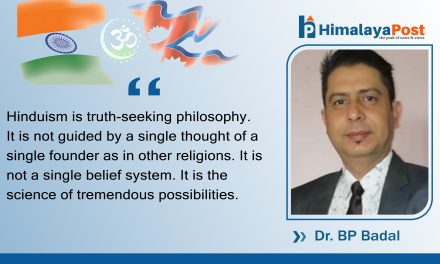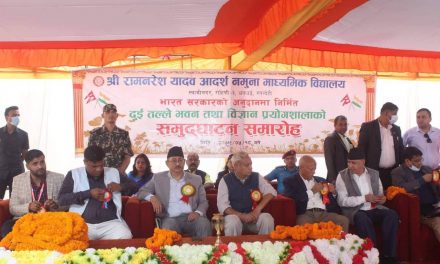– Keshav Nepal
India, often referred to as the “Vishwa Guru” or World Teacher, has firmly established itself as a leading global power. With a rapidly growing economy, currently the fifth-largest in the world, India has aspirations to ascend to the third position soon. It also boasts the title of the world’s largest democracy, reflecting its deep-rooted cultural heritage and democratic values. This unique position enables India to influence global events, not only through economic power but also through its cultural and democratic influence.
As a regional giant, India plays a crucial role in shaping the future of South Asia. Nepal, one of India’s closest neighbors, has much to gain from aligning more closely with India. However, despite shared history, culture, and an open border, the relationship between India and Nepal has faced challenges, often driven by political missteps and misunderstandings. Recent instances of disregard and neglect towards high-profile politicians in Delhi have compelled them to re-evaluate their inconsistent policies towards India.
India’s Role as a Global Leader and the Vishwa Guru
India’s rise is not solely due to its economic success. It is also its position as the largest democracy in a region marked by autocracies that stands out. India exemplifies values such as freedom, equality, and secularism, all while being a powerhouse of economic innovation and technological progress. Its rich cultural heritage and contributions to global knowledge, from mathematics to medicine, further enhance its global stature.
India’s “Vishwo Guru” identity extends beyond military or economic power. The country’s soft power, reflected in exports like yoga, cinema, and spiritual practices, has amplified its global influence. India’s diplomatic strategy, based on shared values, regional stability, and sustainable growth, aims to foster a peaceful world order. As India’s global stature continues to grow, it plays a pivotal role in shaping the global economic and political landscape.
As India positions itself as the Vishwa Guru with a robust economy and the status of the world’s largest democracy, it holds immense potential to guide not only its citizens, but also its neighbors, including Nepal. The shared open border and deep cultural and historical ties between Nepal and India offer significant opportunities for deeper cooperation. However, Nepal’s ability to engage meaningfully with India has been constrained by political instability and inconsistent foreign policies. Frequent changes in leadership and a lack of coherent diplomatic direction have created uncertainty, deterring Indian investment and cooperation.
Additionally, the nationalistic rhetoric employed by some Nepali politicians has further strained relations. For Nepal to unlock the full potential of its relationship with India, both countries must prioritize strengthening diplomatic engagement, promoting a positive narrative around bilateral ties, and fostering political unity within Nepal. A balanced and thoughtful approach to foreign policy will help ensure a mutually beneficial future for both nations.
Nepal: A Crucial Neighbor with Diplomatic Struggles
Despite the immense potential for cooperation, Nepal’s relationship with India has faced many challenges. While Nepal shares an open border with India and has deep historical, cultural, and religious ties, these have not always translated into a harmonious diplomatic relationship. Political instability, inconsistent foreign policy, and historical grievances have complicated Nepal-India relations.
Misreading India’s Strategic Concerns
One of the key issues in Nepal’s diplomatic struggles lies in its misreading of India’s strategic concerns. Nepal’s location between India and other regional powers makes it a critical player in India’s security calculations. India has long viewed Nepal’s foreign policy moves through the lens of its own security and regional stability. When Nepal’s foreign policy decisions seem inconsistent or misaligned with India’s strategic interests, tensions arise, even if Nepal does not intend to challenge India’s influence.
India’s cold reception of Nepalese officials reflects security concerns. Nepal has often underestimated the significance of its relationship with India and the importance India places on strategic dominance in South Asia. Nepal’s failure to effectively communicate its intentions has contributed to diplomatic tensions. Transparent communication about its foreign policy would have alleviated misunderstandings and fostered trust, helping reduce India’s concerns about Nepal’s long-term objectives.
Diplomatic Gaps and Policy Incoherence
Inconsistent foreign policy has contributed to the strain in Nepal-India relations. Political instability in Nepal has led to frequent changes in leadership, resulting in reactive and unclear foreign policies. This inconsistency has left India confused about Nepal’s long-term objectives. India’s foreign policy, in contrast, has remained stable and consistent, focused on regional stability and strong relationships with its neighbors. Nepal’s failure to institutionalize a consistent foreign policy approach, particularly with India, has deepened confusion and distrust in New Delhi.
The Role of Media and Public Perception
Media narratives also play a significant role in shaping perceptions. In Nepal, some media outlets have portrayed India as a hegemonic neighbor, fueling negative sentiments and creating distrust. Similarly, India’s media has sometimes depicted Nepal’s actions as undermining India’s regional interests. These media-driven narratives have contributed to the diplomatic divide, reinforcing suspicion and hostility on both sides.
The Way Forward for Nepal-India Relations
Despite current challenges, there is significant potential for Nepal and India to rebuild their relationship. For this to happen, both countries must prioritize transparent communication, mutual respect, and sustained diplomatic engagement.
1. Revitalize Diplomatic Engagement: Nepal should prioritize strengthening institutionalized dialogues, like the Nepal-India Joint Commission, to address critical issues and foster economic cooperation.
2. Address Security Concerns Transparently: Nepal must acknowledge India’s security concerns and communicate its foreign policy decisions clearly. Transparency will help build trust and reduce misunderstandings.
2. Leverage Economic Interdependence: While Nepal diversifies its international partnerships, it must ensure these relationships do not undermine its crucial economic and cultural ties with India. Open communication about its intentions will help maintain this balance.
3. Strengthen People-to-People Ties: Cultural exchanges, tourism, and educational programs will reinforce the deep-rooted bonds between Nepal and India, mitigating negative narratives and fostering goodwill.
Conclusion
Nepal’s diplomatic struggles with India arise from misreading’s of India’s strategic concerns, compounded by inconsistent foreign policies and a lack of transparent communication. Nepal plays a crucial role in India’s security calculations, yet it has often overlooked the importance of aligning its foreign policy with the neighbor’s interests. The cold reception of Nepalese officials reflects these concerns, especially regarding Nepal’s evolving external engagements. Despite the economic, cultural, and social interdependence, Nepal’s attempts to diversify its foreign relations have led to tensions, exacerbated by the lack of clarity in Nepal’s foreign policy decisions.
To repair ties with India, Nepal must prioritize clear communication, foster mutual trust through concrete actions, uphold shared cultural values, and pursue a balanced foreign policy. Strengthening diplomatic engagement, promoting people-to-people connections, and fostering mutual respect will be key to rebuilding a stable and cooperative relationship between Nepal and India, ensuring sustainable growth and regional stability.





